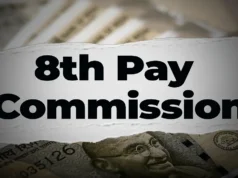New Pension Scheme: Starting on April 1, the central government is planning to apply the Unified Pension Scheme (UPS.). This system aims to give the central government staff a set pension sum. The National Pension System (NPS) is underlining this arrangement. This program is solely for central government staff members at the moment; yet, in the future state government personnel could also be under its jurisdiction.
From April 1, the central government is intending to apply the Unified Pension Scheme (UPS). This system aims to give the central government staff a set pension sum. The National Pension System (NPS) is underlining this arrangement. This program is solely for central government staff members at the moment; but, in future state governments, they can also be under jurisdiction.
The Unified Pension Scheme (UPS) aims to give employees 50% assured pension. Should you be a government worker already under NPS, you will be free to select UPS. Should an employee have at least 25 years of experience, he will receive 50% of the average basic pay for the past 12 months as pension. Should the service last more than ten years, at least Rs 10,000 every month pension will be paid. Should the pensioner pass away, the family will receive sixty percent of the last payment as family pension.
Also Read:- New Special Train Alert: Two special trains announced – Check their route and stops!
The National Pension System (NPS) what is it?
In 2004 the Central Government replaced the Old Pension Scheme (OPS) with the National Pension System (NPS). Originally only for government employees, it was offered to all citizens, Non-Resident Indians (NRIs), self-employed individuals, and unorganized sector workers in 2009 as well.
In what manner does NPS operate?
Employees’ pay is reduced by a set amount that is then placed into market-based investment plans. Up to 60% of the total may be taken as a lump payment at retirement; the remaining 40% must be mandatorially invested in an annuity, which generates monthly pension. NPS does not guarantee pension unlike OPS. The performance of the stock market and investment strategies determines the pension amount just completely.
The Old Pension Scheme (OPS)?
Government workers were awarded pension under the Old Pension Scheme (OPS) prior to NPS. Based on his last employment pay, the employee received a pension in this regard. The government paid for all of the pension; the employee did not have to pay any contribution. Two times annually, DA (Dearness Allowance) was raised. The family received pension as well after the pensioner passed away.
But the government decided the plan would not be financially sustainable over time, hence it was shelved in December 2003 and NPS was launched from 2004. While many states have lately reinstated OPS in response to employee demand, the national government has thus so far refrained to do so.
Among UPS, NPS, and OPS which is better?
Combining OPS and NPS, the Unified Pension Scheme (UPS) provides family pensions, minimum and fixed pension guarantees. The government and the staff both have to help to maintain the fund robust. Those who wish a sure and steady pension will find this helpful.
National Pension System (NPS): Although the government does not promise anything in this, you could make great profits should the stock market do well. Those that grasp investment will eventually make more money. The risk is somewhat substantial, though, since the pension value relies on the state of the market.
Old Pension Scheme (OPS): Since DA also changed occasionally and the government used to grant full pension, this was the most advantageous. However, the government is not in the mood to bring it back since it could aggravate the financial load.










